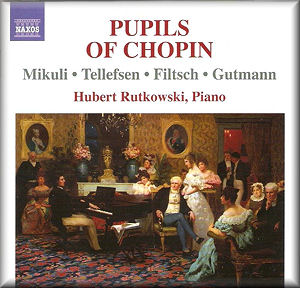 |
 |
|


alternatively
CD: MDT
AmazonUK
AmazonUS
Sound
Samples & Downloads
|
Pupils of Chopin
Karol MIKULI (1819-1897)
Two Polonaises, Op. 8: No. 1 in G minor [5:25]
Piano Pieces, Op. 24; Nos 7-10 [12:24]
Two Polonaises, Op. 8: No. 2 in A flat major [4:50]
Thomas Dyke Ackland TELLEFSEN (1823-1874)
Waltz in D flat major, Op. 27 [4:02]
Impromptu in G major, Op. 38 [4:13]
Le petite mendiante, Op. 23 [2:42]
Four Mazurkas, Op. 3 [9:10]
Carl FILTSCH (1830-1845)
Impromptu No. 1 in G flat major [4:06]
Mazurka in E flat minor, Op. 3, No. 3 [4:00]
Das Lebewohl von Venedig [3:40]
Barcarolle in G flat major [1:41]
Romanze ohne Worte [3:02]
Impromptu No. 2 in B flat minor [5:24]
Adolph GUTMANN (1819-1882)
Nocturne in A flat major, Op. 8, No. 1 [3:49]
Le Réveil des Oiseaux – Idylle, Op. 44 [3:53]
Boléro, Op. 35 [6:30]
 Hubert Rutkowski (piano)
Hubert Rutkowski (piano)
rec. July, September and October 2009, Witold Lutoslawski Concert
Studio of Polish Radio, Warsaw
 NAXOS 8.572344 [78:50]
NAXOS 8.572344 [78:50] 
|
|
|
The quartet of Chopin pupils presented on this disc may or
may not be known to you. Certainly Mikuli should be, as he’s
the best known, but Tellefsen may also have crossed your musical
horizons at some point; the short-lived Filtsch probably only
via a semi-celebrated comment from Liszt and Gutmann, I suspect,
not at all. Together we have twenty-two pieces of music, all
brief, in dance or salon form, all predominantly light; a profusion,
in other words, of Polonaises, Barcarolles, Impromptus, Waltzes,
Mazurkas and the odd Nocturne and Bolero: a very Chopinesque
kind of selection, albeit without sonatas.
Mikuli’s first Op.8 Polonaise brings one up short with its quotation
from the rather better known Chopin Polonaise in F sharp minor
Op.44, a tribute if ever there was one. Of the ten Piano Pieces
Op.24, Hubert Rutkowski has selected the last four and of those
four the Eighth, an Etude, is bright and virtuosic, the Ninth,
a Cantilène seeks – and here finds – a singing tone, and the
final Piece, an Impromptu, offers a mixture of virtuosity and
poetry. Tellefsen, or Thomas Dyke Ackland Tellefsen, was Norwegian
and met Chopin in 1844, studying with him and becoming his copyist.
His Waltz in D flat major is deliberately evocative of Chopin,
but it’s the four Mazurkas that show the best side of him compositionally,
not least the very charming G minor. The F sharp minor is not
especially characterful but has a good sense of contrast and
its promotion of a richly singing line is also attractive.
Carl Filtsch was not quite fifteen when he died, having studied
with Chopin at 11 for a year and a half. Of him Liszt said ‘When
this little one begins to tour, I will have to close up shop.’
His G flat major Impromptu might have been dictated by Chopin
on a weaker day, whilst his Romanze is rather Mendelssohnian
in orientation. The most intriguing work is Das Lebewohl
von Venedig, a sensitively constructed character piece.
Adolph Gutmann took lessons from Chopin in Paris and became
a favourite pupil in the mid 1830s. He was the dedicatee of
Chopin’s Scherzo in C sharp minor Op.39. Gutmann shows considerable
charm in his three pieces, and Le Réveil des Oiseaux – Idylle
in particular would stand up well on the recital stage today.
To all these pieces the young pianist Hubert Rutkowski brings
considerable imagination and a sense of flair and colour that
are most attractive. He’s been finely recorded as well. If you
fancy hearing Chopin’s compositional lineage distilled through
four of his favourite pupils, there can be no better way to
do it than here.
Jonathan Woolf
|
|




 All Nimbus reviews
All Nimbus reviews








